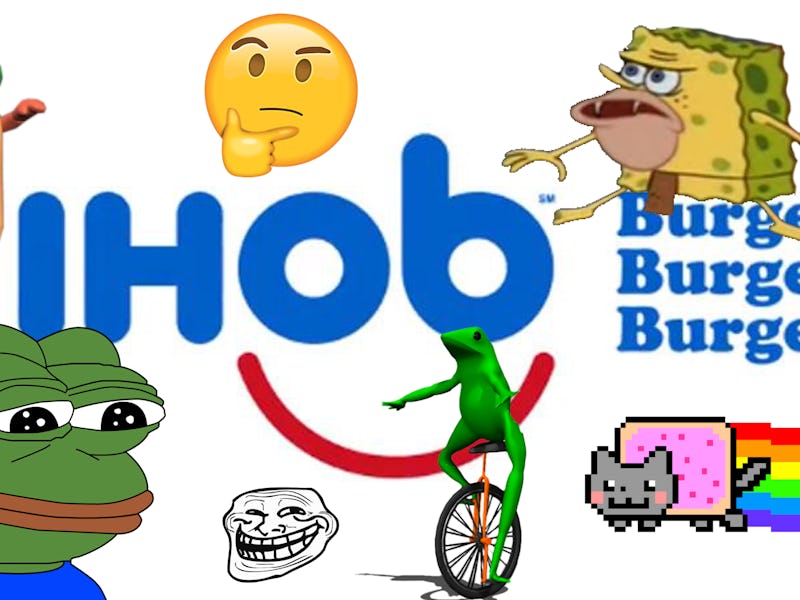The Success of IHOb Confirms the Meme Economy Is Doomed
IHOb sucks, and we deserve it.

If hell is bad memes, the devil is IHOb. The late-night breakfast chain promoting a new line of burgers isn’t funny, quirky, or cute. The way they’re marketing it isn’t particularly smart or impressive. So why did the internet latch onto the International House of Burgers like it was Grumpy Cat?
Every day, some new meme manages to capture the attention of social media, network TV, and your office Slack channel. It could be political, promoted by an influencer, spawn from someone’s five minutes of fame (hello, yodeling boy), or all three. Yesterday, IHOP rose to the top of the meme market, and other brands quickly piggybacked off their success. Memes have gone from being a quirky online phenomenon to the currency of the internet, and like capitalism itself, they’ve gone to shit.
BuzzFeed, the media’s de facto meme curator, labeled 2012 as the year “the meme went mega-mainstream.” That was when Angelina Jolie popped her right knee at the Oscars and the word of the year was GIF. Six years later, and 2018 is a meme in itself.
A meme can be pretty much anything. I’d say a working definition could be anything that goes viral, but you can have memes in online communities so tiny, they’re practically inside jokes. Or, in the case of IHOb, a meme can be bought from a marketing firm and sold to an impressionable audience of millions.
Wall Street-based firm Droga5 created IHOb. They also came up with the powerful Oscars commercial for The New York Times and produced the fake Crocodile Dundee sequel. Their content is meant to be whimsical enough to entertain, but not edgy enough to alienate potential customers. And that’s what sucks about artificially created memes: They just aren’t that funny.
See, there’s this thing called “local humor,” which is not a geographic qualifier so much as it is one denoting comedic taste. If you, like me, are an avid consumer of all things qUIrkY oN tHe iNTerNeT, you may be familiar with this term. It’s used by people who think they’re above the monotony of mainstream meme culture, and it describes people who use overused, outdated, or cringey internet humor.
A local would use memes past their prime — a rage comic, or a meme that’s so basic it isn’t funny — like talking about how much you like wine. (We all like wine, Susan.) Saying a meme is “local” is the “you can’t sit with us!” of being edgy online. Also, anyone who still quotes Mean Girls is probably a local.
Tweeting about how much you love dogs, or saying “pupper” unironically, is local. Using the font Impact is local. Thinking that liking The Office counts as a personality trait is local. And whatever category of humor IHOb falls into is, without a doubt, local. It’s The Big Bang Theory of memes — it’s not really funny, it’s actually annoying as hell, and for some reason, lots of people like it.
Because here’s the thing, whether you like local humor or not, it’s successful. It gets lots of retweets and internet points, and that means money and/or clout. The restaurant formerly known as IHOP gained over 20,000 followers in the last 24 hours, when a week ago it was lucky to gain 10. The reaction was overwhelmingly negative toward the concept of IHOb, but that translates into a lot of attention, and even negative attention is good attention in the ever-growing gig economy.
Speaking of making a living off of your social media accounts, every YouTuber, internet commentator, and Chrissy Teigen-esque personality on Twitter had their say on IHOb, because if you tweet about something popular, you’re more likely to get likes and RTs and followers. And if I was counting on MY Twitter followers to buy MY T-shirts and watch MY videos, I’d probably tweet about IHOb, too. Because being successful on the internet and in real life inevitably leads to selling out. Sorry, Banksy, but if your art doesn’t sell, you gotta appeal to the masses.
It’s no surprise that every other fast food joint on the planet had to get in on the IHOb madness. Wendy’s, Burger King, Chili’s, Checkers & Rally’s, Denny’s, Whataburger, Steak-umm, and A&W are just a few of the brands that capitalized on the meme of the day. Even brands like Netflix, Chiquita, Moonpie, and Pop-Tarts tweeted about IHOb, even though they have no stake in burgers because it meant a few more clicks in their direction. Did I mention that all of those tweets utilized local humor?
If I sound like Jerry Seinfeld complaining that college kids don’t understand comedy anymore, just know that I know I’m no better than anyone else who cashed in on the IHOb craze. I can’t blame people for wanting to engage with corporate humor instead of worrying about net neutrality or following me on Tumblr. I guess I’m just annoyed that advertisers have crept onto my internet lawn. Couldn’t we enjoy memes without letting corporate interests take over? Probably not. We made our own meme hell — now we have to lie in it.